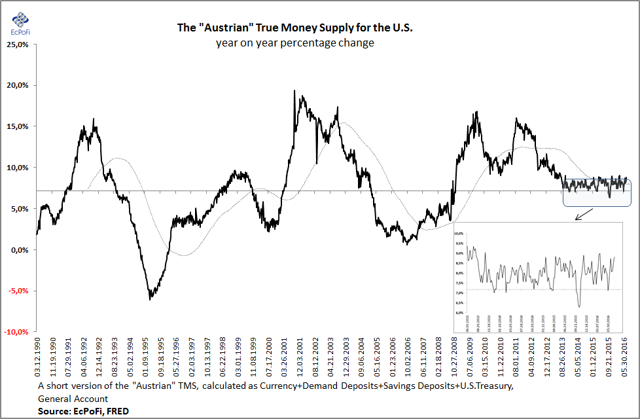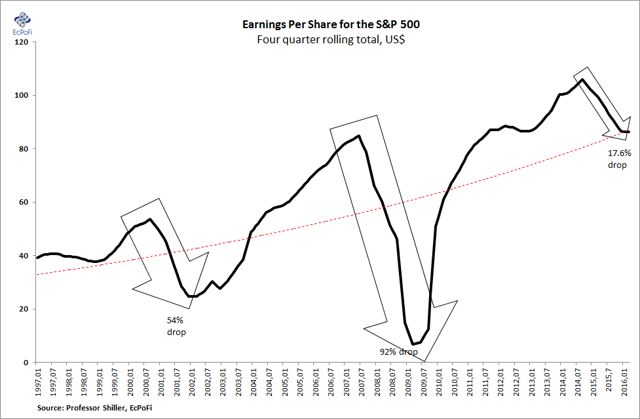Stock market prices are largely driven by money supply developments and investors' willingness to invest in stocks. The former determines earnings growth rates and affects interest rates, which again influences valuation multiples (e.g. P/E ratios). The latter determines prices arguably in a more direct fashion as an increased willingness to buy (sell) can push prices up (down) even absent any (expected) changes in fundamentals. Such psychological forces tend to dominate at market extremes as evidenced by exceedingly high or low valuations at market peaks and troughs.
During the bull market, earnings and the valuations of those earnings (e.g. the P/E ratio) increase. Stock prices hence benefit from both higher earnings and higher valuation multiples. But the expansions of both must one day come to an end as they're partly based on unsustainable foundations; the money supply growth rate cannot expand ceaselessly and interest rates cannot forever be pushed artificially lower. Any attempt by governments and the banking system to do so over the longer term would ultimately trigger the breakdown of the monetary system as hyperinflation would set in rendering the currency worthless and hence useless as the medium of exchange (money).
Generally speaking, the stock market is meant to reflect the underlying economic realities of the companies it represents. Swings in the money supply growth rate (the money cycle) have a very similar effect on the stock market as it has on the various economic aggregates measured in monetary terms, with one key difference: the stock market can react more violently to money cycles than the economy at large can. This is especially the case during (the latter stages of) the bull market when market participants drive stock prices above what any prudent assessment of fundamentals might suggest - the US stock market has been in such a territory for at least the last two years (e.g. here).
However, at some stage the money cycle will negatively affect the stock market just as it affects the real economy; the stock market cannot stay disconnected from the real economy forever. The upward swing of the money cycle, whether it's driven by bank credit growth or the central bank monetising debt, or both, will result in corporate earnings that are higher, and interest rates that are lower, than they otherwise would be. Lower interest rates, to the extent they're not offset by a similar rise in the risk premium, will usually lead to higher stock market valuations due to a reduction of the discount rate.
But, these increases in corporate earnings and decreases in interest rates are not solely created from within the market. Instead, inflated earnings and artificially low interest rates are created outside of the market by governments, central banks, and banks interfering with the market through deficit spending, bank credit growth and, in recent years, debt monetisation by central banks. Stock market prices dependent on ever-inflating corporate earnings and interest rates kept below their natural level are hence only sustainable to the extent the rate of monetary inflation can continue to expand.
The rate of monetary expansion must however one day seize to expand any further, decline, or even contract. The U.S. money supply growth rate has now been in the former camp for the last three years or so (see article published earlier today).
(click to enlarge)

When the money supply growth rate stagnates or contracts, corporate earnings will then typically contract as the forces that previously drove them up will now reverse and push them down. This earnings decline is already underway.
(click to enlarge)

Interest rates will rise for the same reasons as money becomes "scarce" instead of "abundant". This development remains largely absent for now, except for junk bond yields which are markedly higher today than a year ago. The stock market hence is "over-valued" to the extent stock market valuations (based on forecasted earnings and discount rates) don't reflect these inevitable and negative economic developments, and when they fail to recognise that earnings are in fact overstated while interest rates are at unsustainably low levels. That is, the stock market must eventually fall if inflated earnings and artificially low interest rates are, incorrectly so, assumed by stock market participants to be sustainable. Given the current lofty valuations of the U.S. stock market (e.g. CAPE of close to 27, here), market participants certainly do seem to believe both are sustainable. Soon enough they'll be proven very wrong. Bank stocks, where such troubles are frequently traded on earlier than elsewhere, have been flagging warning signs with their falling stock prices for the past year.
During the bull market, earnings and the valuations of those earnings (e.g. the P/E ratio) increase. Stock prices hence benefit from both higher earnings and higher valuation multiples. But the expansions of both must one day come to an end as they're partly based on unsustainable foundations; the money supply growth rate cannot expand ceaselessly and interest rates cannot forever be pushed artificially lower. Any attempt by governments and the banking system to do so over the longer term would ultimately trigger the breakdown of the monetary system as hyperinflation would set in rendering the currency worthless and hence useless as the medium of exchange (money).
Generally speaking, the stock market is meant to reflect the underlying economic realities of the companies it represents. Swings in the money supply growth rate (the money cycle) have a very similar effect on the stock market as it has on the various economic aggregates measured in monetary terms, with one key difference: the stock market can react more violently to money cycles than the economy at large can. This is especially the case during (the latter stages of) the bull market when market participants drive stock prices above what any prudent assessment of fundamentals might suggest - the US stock market has been in such a territory for at least the last two years (e.g. here).
However, at some stage the money cycle will negatively affect the stock market just as it affects the real economy; the stock market cannot stay disconnected from the real economy forever. The upward swing of the money cycle, whether it's driven by bank credit growth or the central bank monetising debt, or both, will result in corporate earnings that are higher, and interest rates that are lower, than they otherwise would be. Lower interest rates, to the extent they're not offset by a similar rise in the risk premium, will usually lead to higher stock market valuations due to a reduction of the discount rate.
But, these increases in corporate earnings and decreases in interest rates are not solely created from within the market. Instead, inflated earnings and artificially low interest rates are created outside of the market by governments, central banks, and banks interfering with the market through deficit spending, bank credit growth and, in recent years, debt monetisation by central banks. Stock market prices dependent on ever-inflating corporate earnings and interest rates kept below their natural level are hence only sustainable to the extent the rate of monetary inflation can continue to expand.
The rate of monetary expansion must however one day seize to expand any further, decline, or even contract. The U.S. money supply growth rate has now been in the former camp for the last three years or so (see article published earlier today).
(click to enlarge)

When the money supply growth rate stagnates or contracts, corporate earnings will then typically contract as the forces that previously drove them up will now reverse and push them down. This earnings decline is already underway.
(click to enlarge)

Interest rates will rise for the same reasons as money becomes "scarce" instead of "abundant". This development remains largely absent for now, except for junk bond yields which are markedly higher today than a year ago. The stock market hence is "over-valued" to the extent stock market valuations (based on forecasted earnings and discount rates) don't reflect these inevitable and negative economic developments, and when they fail to recognise that earnings are in fact overstated while interest rates are at unsustainably low levels. That is, the stock market must eventually fall if inflated earnings and artificially low interest rates are, incorrectly so, assumed by stock market participants to be sustainable. Given the current lofty valuations of the U.S. stock market (e.g. CAPE of close to 27, here), market participants certainly do seem to believe both are sustainable. Soon enough they'll be proven very wrong. Bank stocks, where such troubles are frequently traded on earlier than elsewhere, have been flagging warning signs with their falling stock prices for the past year.
No comments:
Post a Comment